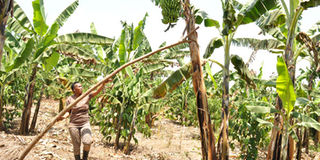Progress made in banana research but slowed by lack of biotech law

If the law on biotechnology was in place, farmers would be able to access improved banana varieties developed by researchers. Photo by Rachel Mabala
Like any other farmer, those who grow bananas are faced with the challenge of pests and diseases.
Several crops such as beans, groundnuts, sorghum, millet, maize, cassava, rice, sweet potatoes and green vegetables have the challenge of pest and disease infection as well as the effects of climate change.
Banana, identified by the ministry of Agriculture as a priority crop, is infested with diseases such as banana bacterial wilt and black sigatoka and pests such as nematodes and other insects.
The National Agricultural Research Organisation (Naro) has been developing better varieties using both conventional methods and biotechnology to overcome the challenges.
Faster and focused
The work is being carried out at National Agricultural Research Laboratories (Narl) in Kawanda. Some of the activities are in confined field trials. This includes work on sweet banana to boost its nutritive value by adding Vitamin A.
Initially, breeding was done conventionally where they would ripen the banana, then squeeze it through wire mesh to get the seeds. These would be put in a media and allowed to grow, transferred to a greenhouse and eventually taken for the field trial.
Subsequently, the scientists considered biotechnology as a better mechanism because it made the work faster and focused. For instance, the scientists are able to introduce a gene of interest either for disease and pest resistance or improving the nutrient content but leave the plant with its original characteristics intact.
Dr Andrew Kiggundu, who heads the National Agro-Biotechnology Centre, which is based at Narl, explained this to science journalists who visited the institute. They were on a field visit to find out the status of biotechnology research amidst the unresolved debate on the law to regulate it.
The team had concluded research on banana fortification. The results are promising because the Vitamin A content in the sweet banana varieties is six times more than in the ordinary sweet banana.
Similar research
Dr Geoffrey Arinaitwe, who led the research, explained that after the research showed promising results, his team moved to doing the same with cooking bananas (matooke).
This is because the cooking banana, which is commonly consumed lacks nutrients such as Vitamin A and iron.
The genes inserted in the sweet banana varieties were extracted from an Asian banana cultivar known as Asupina. This variety is rich in Vitamin A. It is the same gene being used for the ongoing trial with cooking banana varieties.
They selected farmer-preferred varieties namely Nakitembe and M9. The latter is also known as Kiwangazi, a hybrid that is under confined field trial at the Institute. These are the varieties, which will be released to farmers if the research is successful.
As scientists in Uganda conducted research on sweet banana, those in Australia did theirs on banana varieties, known here as Bogoya. Dr Kiggundu pointed out that it is a requirement by all governments in the world to ensure that the citizens consume food rich in Vitamin A and iron.
Key objective
In Uganda, Vitamin A is supplemented in cooking oil. Nutrients such as iodine are also a requirement. The reason why it is contained in salt, a key requirement when cooking food.
Dr Kiggundu opined that as farmers contend with the pest and disease burden coupled with effects of climate change, there is need for policy makers to consider passing the biotechnology and biosafety Bill.
This would enable them roll out the biotech products developed by Naro to farmers.
Apart from farmers benefiting from growing GM (genetically modified) crops meant for food consumption, there are others such as cotton, which could be adopted by multinational companies joining the value chain because they can control its products such as seed for oil, lint for ginnery and cotton cake for animal feed.
The Bill applies to research and release of biotechnology products. But there has been a lot of debate with some parties arguing for the Bill to be scrapped. Right now, there seems to be indecision by Parliament on how to proceed. Others note that a key objective is to address procedural and safety aspects of biotechnology research.




